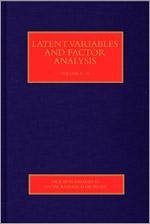Latent Variables and Factor Analysis
Herausgeber: Babones, Salvatore J
Latent Variables and Factor Analysis
Herausgeber: Babones, Salvatore J
- Broschiertes Buch
- Merkliste
- Auf die Merkliste
- Bewerten Bewerten
- Teilen
- Produkt teilen
- Produkterinnerung
- Produkterinnerung
This four-volume Major Work contains texts which explore both the foundations of latent variables and factor analysis, and specific contemporary challenges in the field. The collection has been designed as a multi-disciplinary resource, with literature drawn from many different areas of study, such as sociology, psychology, education and political science. In the editor's introductory essay, a general approach to the meaning and use of latent variables in the social sciences is laid out, the basics of factor analysis and how it works are explained, and the logic that guided the selection of…mehr
Andere Kunden interessierten sich auch für
![Interaction Effects in Factorial Analysis of Variance Interaction Effects in Factorial Analysis of Variance]() James JaccardInteraction Effects in Factorial Analysis of Variance46,99 €
James JaccardInteraction Effects in Factorial Analysis of Variance46,99 €![Categorical Data Analysis Categorical Data Analysis]() Categorical Data Analysis1.377,99 €
Categorical Data Analysis1.377,99 €![Factor Analysis at 100 Factor Analysis at 100]() Factor Analysis at 10080,99 €
Factor Analysis at 10080,99 €![The B.S. Factor The B.S. Factor]() Arthur Herzog IIIThe B.S. Factor15,99 €
Arthur Herzog IIIThe B.S. Factor15,99 €![Time Series Analysis Time Series Analysis]() Charles W OstromTime Series Analysis49,99 €
Charles W OstromTime Series Analysis49,99 €![Statistical Analysis of Continuous Data Statistical Analysis of Continuous Data]() Statistical Analysis of Continuous Data1.578,99 €
Statistical Analysis of Continuous Data1.578,99 €![Fundamentals of Regression Modeling Fundamentals of Regression Modeling]() Fundamentals of Regression Modeling1.232,99 €
Fundamentals of Regression Modeling1.232,99 €-
-
-
This four-volume Major Work contains texts which explore both the foundations of latent variables and factor analysis, and specific contemporary challenges in the field. The collection has been designed as a multi-disciplinary resource, with literature drawn from many different areas of study, such as sociology, psychology, education and political science. In the editor's introductory essay, a general approach to the meaning and use of latent variables in the social sciences is laid out, the basics of factor analysis and how it works are explained, and the logic that guided the selection of literature included in the collection is elaborated upon. The combination of these elements makes for a truly comprehensive and user-friendly research tool, invaluable to social scientists across a range of disciplines. Volume One: The Conceptualization and Operationalization of Variables Volume Two: Applications of Unmeasured Variables Volume Three: Factor Analysis for Latent Variables Volume Four: Advanced Topics
Hinweis: Dieser Artikel kann nur an eine deutsche Lieferadresse ausgeliefert werden.
Hinweis: Dieser Artikel kann nur an eine deutsche Lieferadresse ausgeliefert werden.
Produktdetails
- Produktdetails
- Verlag: Sage Publications
- Four-Volume Set edition
- Seitenzahl: 1472
- Erscheinungstermin: 26. März 2015
- Englisch
- Abmessung: 241mm x 163mm x 102mm
- Gewicht: 2740g
- ISBN-13: 9781446294604
- ISBN-10: 1446294609
- Artikelnr.: 40556375
- Herstellerkennzeichnung
- Libri GmbH
- Europaallee 1
- 36244 Bad Hersfeld
- gpsr@libri.de
- Verlag: Sage Publications
- Four-Volume Set edition
- Seitenzahl: 1472
- Erscheinungstermin: 26. März 2015
- Englisch
- Abmessung: 241mm x 163mm x 102mm
- Gewicht: 2740g
- ISBN-13: 9781446294604
- ISBN-10: 1446294609
- Artikelnr.: 40556375
- Herstellerkennzeichnung
- Libri GmbH
- Europaallee 1
- 36244 Bad Hersfeld
- gpsr@libri.de
Salvatore Babones is an associate professor in sociology & social policy at the University of Sydney. Prior to this he was an assistant professor of sociology, public health, and public & International affairs at the University of Pittsburgh. He has worked as a statistician and statistical consultant in both the private and university sectors. He is the author or editor of eight books and more than two dozen academic research articles. His academic research focuses on emerging market societies and statistical methods for comparative social science research. He is the author most recently of Methods for Quantitative Macro-Comparative Research (Sage, 2014).
VOLUME ONE: MEASUREMENT BASICS
Part One: Perspectives on Measurement
Measurement and Conceptualization Problems: The Major Obstacle to
Integrating Theory and Research - H.M. Blalock, Jr
Detection and Determinants of Bias in Subjective Measures - Kenneth Bollen
and Pamela Paxton
Conventional Wisdom on Measurement: A Structural Equation Perspective -
Kenneth Bollen and Richard Lennox
Measurement in Sociology - Floyd House
A History of Social Science Measurement - Benjamin Wright
Part Two: Construct Validity
Classical and Modern Methods of Psychological Scale Construction - Leonard
Simms
Construct Validity in Psychological Tests - Lee Cronbach and Paul Meehl
Convergent and Discriminant Validation by the Multitrait-Multimethod Matrix
- Donald Campbell and Donald Fiske
Assessing Construct Validity in Organizational Research - Richard Bagozzi,
Youjae Yi and Lynn Phillips
The Empirical Assessment of Construct Validity - Scott O'Leary-Kelly and
Robert Vokurka
The Dangers of Poor Construct Conceptualization - Scott MacKenzie
Part Three: Item Response Theory
Classical Test Theory - Robert DeVellis
The New Rules of Measurement - Susan Embretson
Applying Item Response Theory (IRT) Modeling to Questionnaire Development,
Evaluation and Refinement - Maria Orlando Edelen and Bryce Reeve
The Past and Future of Multidimensional Item Response Theory - Mark Reckase
VOLUME TWO: EXPLORATORY AND CONFIRMATORY FACTOR ANALYSIS
Part Four: Exploratory Factor Analysis
Exploratory Factor Analysis: A User's Guide - Eamonn Ferguson and Tom Cox
Evaluating the Use of Exploratory Factor Analysis in Psychological Research
- Leandre Fabrigar et al.
The Quality of Factor Solutions in Exploratory Factor Analysis: The
Influence of Sample Size, Communality, and Overdetermination - Kristine
Hogarty et al.
A Review and Evaluation of Exploratory Factor Analysis Practices in
Organizational Research - James Conway and Allen Huffcutt
Use of Exploratory Factor Analysis in Published Research: Common Errors and
Some Comment on Improved Practice - Robin Henson and Kyle Roberts
Evaluating the Use of Exploratory Factor Analysis in Developmental
Disability Psychological Research - Megan Norris and Luc Lecavalier
Part Five: Confirmatory Factor Analysis
Factor Analytic Models: Viewing the Structure of an Assessment Instrument
from Three Perspectives - Barbara Byrne
The Generality of Criminal Behavior: A Confirmatory Factor Analysis of the
Criminal Activity of Sex Offenders in Adulthood - Patrick Lussier, Marc
LeBlanc and Jean Proulx
Confirmatory Factor Analyses of Multitrait-Multimethod Data: Many Problems
and a Few Solutions - Herbert Marsh
Sample Size and Number of Parameter Estimates in Maximum Likelihood
Confirmatory Factor Analysis: A Monte Carlo Investigation - Dennis Jackson
Reporting Practices in Confirmatory Factor Analysis: An Overview and Some
Recommendations - Dennis Jackson, J. Arthur Gillaspy, Jr and Rebecca
Purc-Stephenson
Reporting Structural Equation Modeling and Confirmatory Factor Analysis
Results: A Review - James Schreiber et al.
Part Six: Exploratory Versus Confirmatory Factor Analysis
Factor Analysis in Counseling Psychology Research, Training, and Practice:
Principles, Advances, and Applications - Jeffrey Kahn
Exploratory and Confirmatory Factor Analysis: Guidelines, Issues, and
Alternatives - Amy Hurley et al.
Current Methodological Considerations in Exploratory and Confirmatory
Factor Analysis - Thomas Schmitt
Comparing Exploratory and Confirmatory Factor Analysis: A Study on the
5-Factor Model of Personality - Peter Borkenau and Fritz Ostendorf
In Search of Underlying Dimensions: The Use (and Abuse) of Factor Analysis
in Personality and Social Psychology Bulletin - Daniel Russell
VOLUME THREE: ALTERNATIVE APPROACHES TO LATENT VARIABLES
Part Seven: Principal Components Analysis
Component Analysis versus Common Factor Analysis: Some Issues in Selecting
an Appropriate Procedure - Wayne Velicer and Douglas Jackson
Component Analysis versus Common Factor Analysis: A Monte Carlo Study -
Steven Snook and Richard Gorsuch
Common Factor Analysis versus Principal Component Analysis: Differential
Bias in Representing Model Parameters? - Keith Widaman
Constructing Socio-economic Status Indices: How to Use Principal Components
Analysis - Seema Vyas and Lilani Kumaranayake
Part Eight: Formative Measurement
Index Construction with Formative Indicators: An Alternative to Scale
Development - Adamantios Diamantopoulos and Heidi Winklhofer
A Critical Review of Construct Indicators and Measurement Model
Misspecification in Marketing and Consumer Research - Cheryl Burke Jarvis,
Scott MacKenzie and Philip Podsakoff
Interpretation of Formative Measurement in Information Systems Research -
Ronald Cenfetelli and Geneviève Basseller
Advancing Formative Measurement Models - Adamantios Diamantopoulos, Petra
Riefler and Katharina Roth
The Error Term in Formative Measurement Models: Interpretation and Modeling
Implication - Adamantios Diamantopoulos
Questions about Formative Measurement - James Wilcox, Roy Howell and Einar
Breivik
Formative Measurement and Academic Research: In Search of Measurement
Theory - Andrew Hardin et al.
Part Nine: Formative Versus Reflective Measurement
On the Nature and Direction of Relationships between Constructs and
Measures - Jeffrey Edwards and Richard Bagozzi
Reconsidering Formative Measurement - Roy Howell, James Wilcox and Einar
Brievik
Interpretational Confounding Is Due to Misspecification, Not to Type of
Indicator: Comment on Howell, Breivik and Wilcox (2007) - Kenneth Bollen
On the Meaning of Formative Measurement and How It Differs from Reflective
Measurement: Comment on Howell, Breivik and Wilcox (2007) - Richard Bagozzi
Is Formative Measurement Really Measurement? Reply to Bollen (2007) and
Bagozzi (2007) - Roy Howell, James Wilcox and Einar Brievik
The Fallacy of Formative Measurement - Jeffrey Edwards
VOLUME FOUR: ADVANCED TOPICS
Part Ten: Factor Analysis With Ordinal And Dichotomous Data
Empirical Evaluation of Alternative Methods of Estimation for Confirmatory
Factor Analysis with Ordinal Data - David Flora and Patrick Curran
Evaluating Estimation Methods for Ordinal Data in Structural Equation
Modeling - Pui-Wa Lei
The Sensitivity of Confirmatory Maximum Likelihood Analysis to Violations
of Measurement Scale and Distributional Assumptions - Emin Babakus, Carl
Ferguson, Jr and Karl Jöreskog
Polychoric versus Pearson Correlations in Exploratory and Confirmatory
Factor Analysis of Ordinal Variables - Francisco Holgado-Tello et al.
Part Eleven: Factor Rotations
Factor Rotations in Factor Analyses - Hervé Abdi
The Invariance Problem in Factor Analysis - J. Guilford
Rotation Criteria and Hypothesis Testing for Exploratory Factor Analysis:
Implications for Factor Pattern Loadings and Interfactor Correlations -
Thomas Schmitt and Daniel Sass
A Comparison of Factor Rotation Methods for Dichotomous Data - W. Holmes
Finch
Part Twelve: Latent Class Analysis
Searching for Ideal Types: The Potentialities of Latent Class Analysis -
Jacques Hagenaars and Loek Halman
Latent Class Models in Social Work - Susan Neely-Barnes
Identifying Class Structure: A Latent Class Analysis of the
Criterion-Related and Construct Validity of the Goldthorpe Class Schema -
Geoffrey Evans and Colin Mills
Integrating Person-Centered and Variable-Centered Analyses: Growth Mixture
Modeling with Latent Trajectory Classes - Bengt Muthén and Linda Muthén
The Integration of Continuous and Discrete Latent Variable Models:
Potential Problems and Promising Opportunities - Daniel Bauer and Patrick
Curran
Part One: Perspectives on Measurement
Measurement and Conceptualization Problems: The Major Obstacle to
Integrating Theory and Research - H.M. Blalock, Jr
Detection and Determinants of Bias in Subjective Measures - Kenneth Bollen
and Pamela Paxton
Conventional Wisdom on Measurement: A Structural Equation Perspective -
Kenneth Bollen and Richard Lennox
Measurement in Sociology - Floyd House
A History of Social Science Measurement - Benjamin Wright
Part Two: Construct Validity
Classical and Modern Methods of Psychological Scale Construction - Leonard
Simms
Construct Validity in Psychological Tests - Lee Cronbach and Paul Meehl
Convergent and Discriminant Validation by the Multitrait-Multimethod Matrix
- Donald Campbell and Donald Fiske
Assessing Construct Validity in Organizational Research - Richard Bagozzi,
Youjae Yi and Lynn Phillips
The Empirical Assessment of Construct Validity - Scott O'Leary-Kelly and
Robert Vokurka
The Dangers of Poor Construct Conceptualization - Scott MacKenzie
Part Three: Item Response Theory
Classical Test Theory - Robert DeVellis
The New Rules of Measurement - Susan Embretson
Applying Item Response Theory (IRT) Modeling to Questionnaire Development,
Evaluation and Refinement - Maria Orlando Edelen and Bryce Reeve
The Past and Future of Multidimensional Item Response Theory - Mark Reckase
VOLUME TWO: EXPLORATORY AND CONFIRMATORY FACTOR ANALYSIS
Part Four: Exploratory Factor Analysis
Exploratory Factor Analysis: A User's Guide - Eamonn Ferguson and Tom Cox
Evaluating the Use of Exploratory Factor Analysis in Psychological Research
- Leandre Fabrigar et al.
The Quality of Factor Solutions in Exploratory Factor Analysis: The
Influence of Sample Size, Communality, and Overdetermination - Kristine
Hogarty et al.
A Review and Evaluation of Exploratory Factor Analysis Practices in
Organizational Research - James Conway and Allen Huffcutt
Use of Exploratory Factor Analysis in Published Research: Common Errors and
Some Comment on Improved Practice - Robin Henson and Kyle Roberts
Evaluating the Use of Exploratory Factor Analysis in Developmental
Disability Psychological Research - Megan Norris and Luc Lecavalier
Part Five: Confirmatory Factor Analysis
Factor Analytic Models: Viewing the Structure of an Assessment Instrument
from Three Perspectives - Barbara Byrne
The Generality of Criminal Behavior: A Confirmatory Factor Analysis of the
Criminal Activity of Sex Offenders in Adulthood - Patrick Lussier, Marc
LeBlanc and Jean Proulx
Confirmatory Factor Analyses of Multitrait-Multimethod Data: Many Problems
and a Few Solutions - Herbert Marsh
Sample Size and Number of Parameter Estimates in Maximum Likelihood
Confirmatory Factor Analysis: A Monte Carlo Investigation - Dennis Jackson
Reporting Practices in Confirmatory Factor Analysis: An Overview and Some
Recommendations - Dennis Jackson, J. Arthur Gillaspy, Jr and Rebecca
Purc-Stephenson
Reporting Structural Equation Modeling and Confirmatory Factor Analysis
Results: A Review - James Schreiber et al.
Part Six: Exploratory Versus Confirmatory Factor Analysis
Factor Analysis in Counseling Psychology Research, Training, and Practice:
Principles, Advances, and Applications - Jeffrey Kahn
Exploratory and Confirmatory Factor Analysis: Guidelines, Issues, and
Alternatives - Amy Hurley et al.
Current Methodological Considerations in Exploratory and Confirmatory
Factor Analysis - Thomas Schmitt
Comparing Exploratory and Confirmatory Factor Analysis: A Study on the
5-Factor Model of Personality - Peter Borkenau and Fritz Ostendorf
In Search of Underlying Dimensions: The Use (and Abuse) of Factor Analysis
in Personality and Social Psychology Bulletin - Daniel Russell
VOLUME THREE: ALTERNATIVE APPROACHES TO LATENT VARIABLES
Part Seven: Principal Components Analysis
Component Analysis versus Common Factor Analysis: Some Issues in Selecting
an Appropriate Procedure - Wayne Velicer and Douglas Jackson
Component Analysis versus Common Factor Analysis: A Monte Carlo Study -
Steven Snook and Richard Gorsuch
Common Factor Analysis versus Principal Component Analysis: Differential
Bias in Representing Model Parameters? - Keith Widaman
Constructing Socio-economic Status Indices: How to Use Principal Components
Analysis - Seema Vyas and Lilani Kumaranayake
Part Eight: Formative Measurement
Index Construction with Formative Indicators: An Alternative to Scale
Development - Adamantios Diamantopoulos and Heidi Winklhofer
A Critical Review of Construct Indicators and Measurement Model
Misspecification in Marketing and Consumer Research - Cheryl Burke Jarvis,
Scott MacKenzie and Philip Podsakoff
Interpretation of Formative Measurement in Information Systems Research -
Ronald Cenfetelli and Geneviève Basseller
Advancing Formative Measurement Models - Adamantios Diamantopoulos, Petra
Riefler and Katharina Roth
The Error Term in Formative Measurement Models: Interpretation and Modeling
Implication - Adamantios Diamantopoulos
Questions about Formative Measurement - James Wilcox, Roy Howell and Einar
Breivik
Formative Measurement and Academic Research: In Search of Measurement
Theory - Andrew Hardin et al.
Part Nine: Formative Versus Reflective Measurement
On the Nature and Direction of Relationships between Constructs and
Measures - Jeffrey Edwards and Richard Bagozzi
Reconsidering Formative Measurement - Roy Howell, James Wilcox and Einar
Brievik
Interpretational Confounding Is Due to Misspecification, Not to Type of
Indicator: Comment on Howell, Breivik and Wilcox (2007) - Kenneth Bollen
On the Meaning of Formative Measurement and How It Differs from Reflective
Measurement: Comment on Howell, Breivik and Wilcox (2007) - Richard Bagozzi
Is Formative Measurement Really Measurement? Reply to Bollen (2007) and
Bagozzi (2007) - Roy Howell, James Wilcox and Einar Brievik
The Fallacy of Formative Measurement - Jeffrey Edwards
VOLUME FOUR: ADVANCED TOPICS
Part Ten: Factor Analysis With Ordinal And Dichotomous Data
Empirical Evaluation of Alternative Methods of Estimation for Confirmatory
Factor Analysis with Ordinal Data - David Flora and Patrick Curran
Evaluating Estimation Methods for Ordinal Data in Structural Equation
Modeling - Pui-Wa Lei
The Sensitivity of Confirmatory Maximum Likelihood Analysis to Violations
of Measurement Scale and Distributional Assumptions - Emin Babakus, Carl
Ferguson, Jr and Karl Jöreskog
Polychoric versus Pearson Correlations in Exploratory and Confirmatory
Factor Analysis of Ordinal Variables - Francisco Holgado-Tello et al.
Part Eleven: Factor Rotations
Factor Rotations in Factor Analyses - Hervé Abdi
The Invariance Problem in Factor Analysis - J. Guilford
Rotation Criteria and Hypothesis Testing for Exploratory Factor Analysis:
Implications for Factor Pattern Loadings and Interfactor Correlations -
Thomas Schmitt and Daniel Sass
A Comparison of Factor Rotation Methods for Dichotomous Data - W. Holmes
Finch
Part Twelve: Latent Class Analysis
Searching for Ideal Types: The Potentialities of Latent Class Analysis -
Jacques Hagenaars and Loek Halman
Latent Class Models in Social Work - Susan Neely-Barnes
Identifying Class Structure: A Latent Class Analysis of the
Criterion-Related and Construct Validity of the Goldthorpe Class Schema -
Geoffrey Evans and Colin Mills
Integrating Person-Centered and Variable-Centered Analyses: Growth Mixture
Modeling with Latent Trajectory Classes - Bengt Muthén and Linda Muthén
The Integration of Continuous and Discrete Latent Variable Models:
Potential Problems and Promising Opportunities - Daniel Bauer and Patrick
Curran
VOLUME ONE: MEASUREMENT BASICS
Part One: Perspectives on Measurement
Measurement and Conceptualization Problems: The Major Obstacle to
Integrating Theory and Research - H.M. Blalock, Jr
Detection and Determinants of Bias in Subjective Measures - Kenneth Bollen
and Pamela Paxton
Conventional Wisdom on Measurement: A Structural Equation Perspective -
Kenneth Bollen and Richard Lennox
Measurement in Sociology - Floyd House
A History of Social Science Measurement - Benjamin Wright
Part Two: Construct Validity
Classical and Modern Methods of Psychological Scale Construction - Leonard
Simms
Construct Validity in Psychological Tests - Lee Cronbach and Paul Meehl
Convergent and Discriminant Validation by the Multitrait-Multimethod Matrix
- Donald Campbell and Donald Fiske
Assessing Construct Validity in Organizational Research - Richard Bagozzi,
Youjae Yi and Lynn Phillips
The Empirical Assessment of Construct Validity - Scott O'Leary-Kelly and
Robert Vokurka
The Dangers of Poor Construct Conceptualization - Scott MacKenzie
Part Three: Item Response Theory
Classical Test Theory - Robert DeVellis
The New Rules of Measurement - Susan Embretson
Applying Item Response Theory (IRT) Modeling to Questionnaire Development,
Evaluation and Refinement - Maria Orlando Edelen and Bryce Reeve
The Past and Future of Multidimensional Item Response Theory - Mark Reckase
VOLUME TWO: EXPLORATORY AND CONFIRMATORY FACTOR ANALYSIS
Part Four: Exploratory Factor Analysis
Exploratory Factor Analysis: A User's Guide - Eamonn Ferguson and Tom Cox
Evaluating the Use of Exploratory Factor Analysis in Psychological Research
- Leandre Fabrigar et al.
The Quality of Factor Solutions in Exploratory Factor Analysis: The
Influence of Sample Size, Communality, and Overdetermination - Kristine
Hogarty et al.
A Review and Evaluation of Exploratory Factor Analysis Practices in
Organizational Research - James Conway and Allen Huffcutt
Use of Exploratory Factor Analysis in Published Research: Common Errors and
Some Comment on Improved Practice - Robin Henson and Kyle Roberts
Evaluating the Use of Exploratory Factor Analysis in Developmental
Disability Psychological Research - Megan Norris and Luc Lecavalier
Part Five: Confirmatory Factor Analysis
Factor Analytic Models: Viewing the Structure of an Assessment Instrument
from Three Perspectives - Barbara Byrne
The Generality of Criminal Behavior: A Confirmatory Factor Analysis of the
Criminal Activity of Sex Offenders in Adulthood - Patrick Lussier, Marc
LeBlanc and Jean Proulx
Confirmatory Factor Analyses of Multitrait-Multimethod Data: Many Problems
and a Few Solutions - Herbert Marsh
Sample Size and Number of Parameter Estimates in Maximum Likelihood
Confirmatory Factor Analysis: A Monte Carlo Investigation - Dennis Jackson
Reporting Practices in Confirmatory Factor Analysis: An Overview and Some
Recommendations - Dennis Jackson, J. Arthur Gillaspy, Jr and Rebecca
Purc-Stephenson
Reporting Structural Equation Modeling and Confirmatory Factor Analysis
Results: A Review - James Schreiber et al.
Part Six: Exploratory Versus Confirmatory Factor Analysis
Factor Analysis in Counseling Psychology Research, Training, and Practice:
Principles, Advances, and Applications - Jeffrey Kahn
Exploratory and Confirmatory Factor Analysis: Guidelines, Issues, and
Alternatives - Amy Hurley et al.
Current Methodological Considerations in Exploratory and Confirmatory
Factor Analysis - Thomas Schmitt
Comparing Exploratory and Confirmatory Factor Analysis: A Study on the
5-Factor Model of Personality - Peter Borkenau and Fritz Ostendorf
In Search of Underlying Dimensions: The Use (and Abuse) of Factor Analysis
in Personality and Social Psychology Bulletin - Daniel Russell
VOLUME THREE: ALTERNATIVE APPROACHES TO LATENT VARIABLES
Part Seven: Principal Components Analysis
Component Analysis versus Common Factor Analysis: Some Issues in Selecting
an Appropriate Procedure - Wayne Velicer and Douglas Jackson
Component Analysis versus Common Factor Analysis: A Monte Carlo Study -
Steven Snook and Richard Gorsuch
Common Factor Analysis versus Principal Component Analysis: Differential
Bias in Representing Model Parameters? - Keith Widaman
Constructing Socio-economic Status Indices: How to Use Principal Components
Analysis - Seema Vyas and Lilani Kumaranayake
Part Eight: Formative Measurement
Index Construction with Formative Indicators: An Alternative to Scale
Development - Adamantios Diamantopoulos and Heidi Winklhofer
A Critical Review of Construct Indicators and Measurement Model
Misspecification in Marketing and Consumer Research - Cheryl Burke Jarvis,
Scott MacKenzie and Philip Podsakoff
Interpretation of Formative Measurement in Information Systems Research -
Ronald Cenfetelli and Geneviève Basseller
Advancing Formative Measurement Models - Adamantios Diamantopoulos, Petra
Riefler and Katharina Roth
The Error Term in Formative Measurement Models: Interpretation and Modeling
Implication - Adamantios Diamantopoulos
Questions about Formative Measurement - James Wilcox, Roy Howell and Einar
Breivik
Formative Measurement and Academic Research: In Search of Measurement
Theory - Andrew Hardin et al.
Part Nine: Formative Versus Reflective Measurement
On the Nature and Direction of Relationships between Constructs and
Measures - Jeffrey Edwards and Richard Bagozzi
Reconsidering Formative Measurement - Roy Howell, James Wilcox and Einar
Brievik
Interpretational Confounding Is Due to Misspecification, Not to Type of
Indicator: Comment on Howell, Breivik and Wilcox (2007) - Kenneth Bollen
On the Meaning of Formative Measurement and How It Differs from Reflective
Measurement: Comment on Howell, Breivik and Wilcox (2007) - Richard Bagozzi
Is Formative Measurement Really Measurement? Reply to Bollen (2007) and
Bagozzi (2007) - Roy Howell, James Wilcox and Einar Brievik
The Fallacy of Formative Measurement - Jeffrey Edwards
VOLUME FOUR: ADVANCED TOPICS
Part Ten: Factor Analysis With Ordinal And Dichotomous Data
Empirical Evaluation of Alternative Methods of Estimation for Confirmatory
Factor Analysis with Ordinal Data - David Flora and Patrick Curran
Evaluating Estimation Methods for Ordinal Data in Structural Equation
Modeling - Pui-Wa Lei
The Sensitivity of Confirmatory Maximum Likelihood Analysis to Violations
of Measurement Scale and Distributional Assumptions - Emin Babakus, Carl
Ferguson, Jr and Karl Jöreskog
Polychoric versus Pearson Correlations in Exploratory and Confirmatory
Factor Analysis of Ordinal Variables - Francisco Holgado-Tello et al.
Part Eleven: Factor Rotations
Factor Rotations in Factor Analyses - Hervé Abdi
The Invariance Problem in Factor Analysis - J. Guilford
Rotation Criteria and Hypothesis Testing for Exploratory Factor Analysis:
Implications for Factor Pattern Loadings and Interfactor Correlations -
Thomas Schmitt and Daniel Sass
A Comparison of Factor Rotation Methods for Dichotomous Data - W. Holmes
Finch
Part Twelve: Latent Class Analysis
Searching for Ideal Types: The Potentialities of Latent Class Analysis -
Jacques Hagenaars and Loek Halman
Latent Class Models in Social Work - Susan Neely-Barnes
Identifying Class Structure: A Latent Class Analysis of the
Criterion-Related and Construct Validity of the Goldthorpe Class Schema -
Geoffrey Evans and Colin Mills
Integrating Person-Centered and Variable-Centered Analyses: Growth Mixture
Modeling with Latent Trajectory Classes - Bengt Muthén and Linda Muthén
The Integration of Continuous and Discrete Latent Variable Models:
Potential Problems and Promising Opportunities - Daniel Bauer and Patrick
Curran
Part One: Perspectives on Measurement
Measurement and Conceptualization Problems: The Major Obstacle to
Integrating Theory and Research - H.M. Blalock, Jr
Detection and Determinants of Bias in Subjective Measures - Kenneth Bollen
and Pamela Paxton
Conventional Wisdom on Measurement: A Structural Equation Perspective -
Kenneth Bollen and Richard Lennox
Measurement in Sociology - Floyd House
A History of Social Science Measurement - Benjamin Wright
Part Two: Construct Validity
Classical and Modern Methods of Psychological Scale Construction - Leonard
Simms
Construct Validity in Psychological Tests - Lee Cronbach and Paul Meehl
Convergent and Discriminant Validation by the Multitrait-Multimethod Matrix
- Donald Campbell and Donald Fiske
Assessing Construct Validity in Organizational Research - Richard Bagozzi,
Youjae Yi and Lynn Phillips
The Empirical Assessment of Construct Validity - Scott O'Leary-Kelly and
Robert Vokurka
The Dangers of Poor Construct Conceptualization - Scott MacKenzie
Part Three: Item Response Theory
Classical Test Theory - Robert DeVellis
The New Rules of Measurement - Susan Embretson
Applying Item Response Theory (IRT) Modeling to Questionnaire Development,
Evaluation and Refinement - Maria Orlando Edelen and Bryce Reeve
The Past and Future of Multidimensional Item Response Theory - Mark Reckase
VOLUME TWO: EXPLORATORY AND CONFIRMATORY FACTOR ANALYSIS
Part Four: Exploratory Factor Analysis
Exploratory Factor Analysis: A User's Guide - Eamonn Ferguson and Tom Cox
Evaluating the Use of Exploratory Factor Analysis in Psychological Research
- Leandre Fabrigar et al.
The Quality of Factor Solutions in Exploratory Factor Analysis: The
Influence of Sample Size, Communality, and Overdetermination - Kristine
Hogarty et al.
A Review and Evaluation of Exploratory Factor Analysis Practices in
Organizational Research - James Conway and Allen Huffcutt
Use of Exploratory Factor Analysis in Published Research: Common Errors and
Some Comment on Improved Practice - Robin Henson and Kyle Roberts
Evaluating the Use of Exploratory Factor Analysis in Developmental
Disability Psychological Research - Megan Norris and Luc Lecavalier
Part Five: Confirmatory Factor Analysis
Factor Analytic Models: Viewing the Structure of an Assessment Instrument
from Three Perspectives - Barbara Byrne
The Generality of Criminal Behavior: A Confirmatory Factor Analysis of the
Criminal Activity of Sex Offenders in Adulthood - Patrick Lussier, Marc
LeBlanc and Jean Proulx
Confirmatory Factor Analyses of Multitrait-Multimethod Data: Many Problems
and a Few Solutions - Herbert Marsh
Sample Size and Number of Parameter Estimates in Maximum Likelihood
Confirmatory Factor Analysis: A Monte Carlo Investigation - Dennis Jackson
Reporting Practices in Confirmatory Factor Analysis: An Overview and Some
Recommendations - Dennis Jackson, J. Arthur Gillaspy, Jr and Rebecca
Purc-Stephenson
Reporting Structural Equation Modeling and Confirmatory Factor Analysis
Results: A Review - James Schreiber et al.
Part Six: Exploratory Versus Confirmatory Factor Analysis
Factor Analysis in Counseling Psychology Research, Training, and Practice:
Principles, Advances, and Applications - Jeffrey Kahn
Exploratory and Confirmatory Factor Analysis: Guidelines, Issues, and
Alternatives - Amy Hurley et al.
Current Methodological Considerations in Exploratory and Confirmatory
Factor Analysis - Thomas Schmitt
Comparing Exploratory and Confirmatory Factor Analysis: A Study on the
5-Factor Model of Personality - Peter Borkenau and Fritz Ostendorf
In Search of Underlying Dimensions: The Use (and Abuse) of Factor Analysis
in Personality and Social Psychology Bulletin - Daniel Russell
VOLUME THREE: ALTERNATIVE APPROACHES TO LATENT VARIABLES
Part Seven: Principal Components Analysis
Component Analysis versus Common Factor Analysis: Some Issues in Selecting
an Appropriate Procedure - Wayne Velicer and Douglas Jackson
Component Analysis versus Common Factor Analysis: A Monte Carlo Study -
Steven Snook and Richard Gorsuch
Common Factor Analysis versus Principal Component Analysis: Differential
Bias in Representing Model Parameters? - Keith Widaman
Constructing Socio-economic Status Indices: How to Use Principal Components
Analysis - Seema Vyas and Lilani Kumaranayake
Part Eight: Formative Measurement
Index Construction with Formative Indicators: An Alternative to Scale
Development - Adamantios Diamantopoulos and Heidi Winklhofer
A Critical Review of Construct Indicators and Measurement Model
Misspecification in Marketing and Consumer Research - Cheryl Burke Jarvis,
Scott MacKenzie and Philip Podsakoff
Interpretation of Formative Measurement in Information Systems Research -
Ronald Cenfetelli and Geneviève Basseller
Advancing Formative Measurement Models - Adamantios Diamantopoulos, Petra
Riefler and Katharina Roth
The Error Term in Formative Measurement Models: Interpretation and Modeling
Implication - Adamantios Diamantopoulos
Questions about Formative Measurement - James Wilcox, Roy Howell and Einar
Breivik
Formative Measurement and Academic Research: In Search of Measurement
Theory - Andrew Hardin et al.
Part Nine: Formative Versus Reflective Measurement
On the Nature and Direction of Relationships between Constructs and
Measures - Jeffrey Edwards and Richard Bagozzi
Reconsidering Formative Measurement - Roy Howell, James Wilcox and Einar
Brievik
Interpretational Confounding Is Due to Misspecification, Not to Type of
Indicator: Comment on Howell, Breivik and Wilcox (2007) - Kenneth Bollen
On the Meaning of Formative Measurement and How It Differs from Reflective
Measurement: Comment on Howell, Breivik and Wilcox (2007) - Richard Bagozzi
Is Formative Measurement Really Measurement? Reply to Bollen (2007) and
Bagozzi (2007) - Roy Howell, James Wilcox and Einar Brievik
The Fallacy of Formative Measurement - Jeffrey Edwards
VOLUME FOUR: ADVANCED TOPICS
Part Ten: Factor Analysis With Ordinal And Dichotomous Data
Empirical Evaluation of Alternative Methods of Estimation for Confirmatory
Factor Analysis with Ordinal Data - David Flora and Patrick Curran
Evaluating Estimation Methods for Ordinal Data in Structural Equation
Modeling - Pui-Wa Lei
The Sensitivity of Confirmatory Maximum Likelihood Analysis to Violations
of Measurement Scale and Distributional Assumptions - Emin Babakus, Carl
Ferguson, Jr and Karl Jöreskog
Polychoric versus Pearson Correlations in Exploratory and Confirmatory
Factor Analysis of Ordinal Variables - Francisco Holgado-Tello et al.
Part Eleven: Factor Rotations
Factor Rotations in Factor Analyses - Hervé Abdi
The Invariance Problem in Factor Analysis - J. Guilford
Rotation Criteria and Hypothesis Testing for Exploratory Factor Analysis:
Implications for Factor Pattern Loadings and Interfactor Correlations -
Thomas Schmitt and Daniel Sass
A Comparison of Factor Rotation Methods for Dichotomous Data - W. Holmes
Finch
Part Twelve: Latent Class Analysis
Searching for Ideal Types: The Potentialities of Latent Class Analysis -
Jacques Hagenaars and Loek Halman
Latent Class Models in Social Work - Susan Neely-Barnes
Identifying Class Structure: A Latent Class Analysis of the
Criterion-Related and Construct Validity of the Goldthorpe Class Schema -
Geoffrey Evans and Colin Mills
Integrating Person-Centered and Variable-Centered Analyses: Growth Mixture
Modeling with Latent Trajectory Classes - Bengt Muthén and Linda Muthén
The Integration of Continuous and Discrete Latent Variable Models:
Potential Problems and Promising Opportunities - Daniel Bauer and Patrick
Curran








